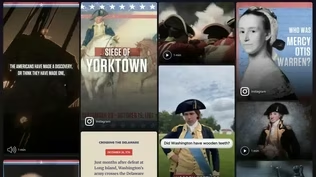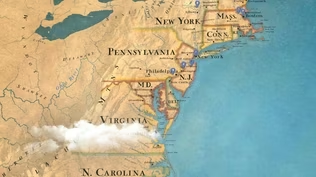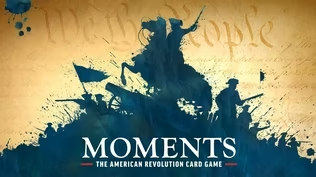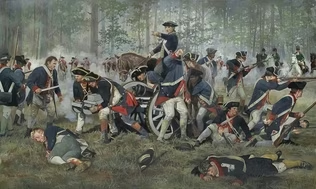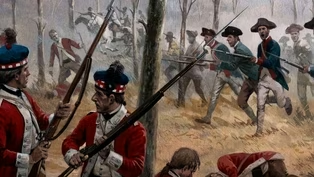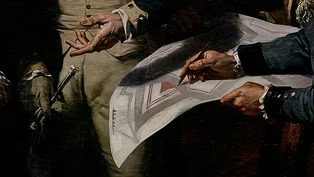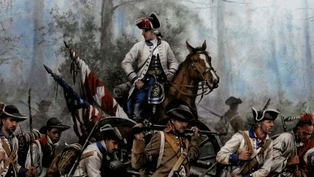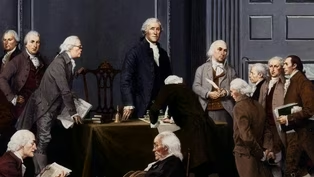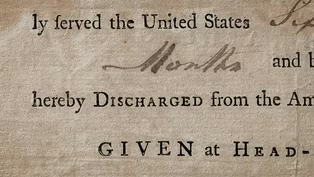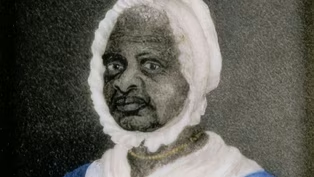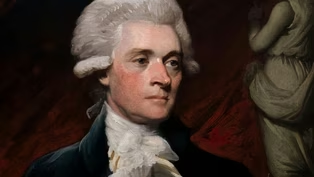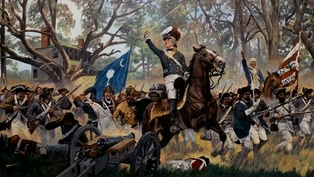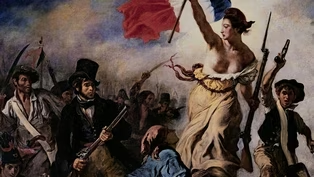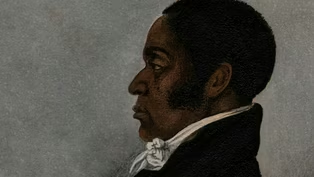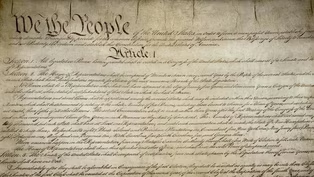
Benedict Arnold Turns Traitor and Defects to the British
Clip: Episode 6 | 6m 4sVideo has Closed Captions
George Washington discovers that Benedict Arnold has abandoned his post and defected to the British.
Washington discovers that Benedict Arnold has defected and planned to surrender West Point – and the men stationed there – to the British. Arnold accomplished miracles on the battlefield and felt that he did not receive due recognition. The spy who turned Arnold traitor is caught and hanged. However, Arnold escapes and takes command of a British regiment known as the American Legion.
Problems playing video? | Closed Captioning Feedback
Problems playing video? | Closed Captioning Feedback
Episodes presented in 4K UHD on supported devices. Corporate funding for THE AMERICAN REVOLUTION was provided by Bank of America. Major funding was provided by The Better Angels Society and...

Benedict Arnold Turns Traitor and Defects to the British
Clip: Episode 6 | 6m 4sVideo has Closed Captions
Washington discovers that Benedict Arnold has defected and planned to surrender West Point – and the men stationed there – to the British. Arnold accomplished miracles on the battlefield and felt that he did not receive due recognition. The spy who turned Arnold traitor is caught and hanged. However, Arnold escapes and takes command of a British regiment known as the American Legion.
Problems playing video? | Closed Captioning Feedback
How to Watch The American Revolution
The American Revolution is available to stream on pbs.org and the free PBS App, available on iPhone, Apple TV, Android TV, Android smartphones, Amazon Fire TV, Amazon Fire Tablet, Roku, Samsung Smart TV, and Vizio.
Buy Now
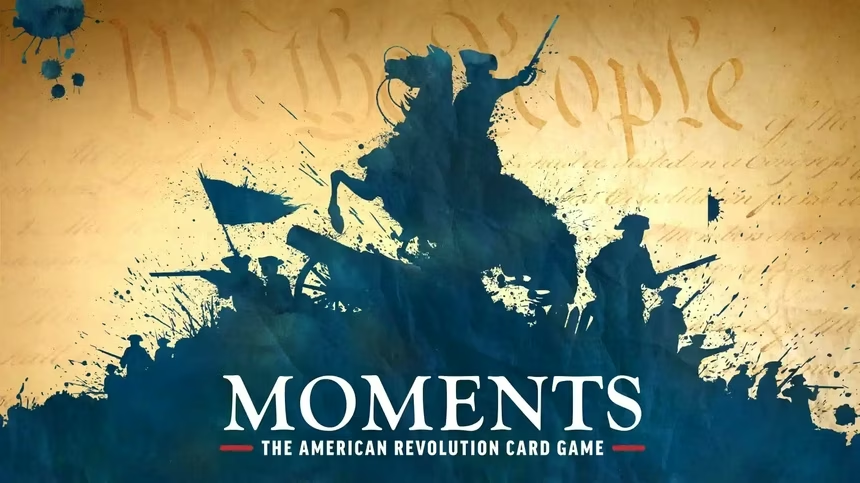
MOMENTS: The Revolutionary War Card Game
Use your knowledge of Revolutionary-era moments to build a timeline of real historical events.Providing Support for PBS.org
Learn Moreabout PBS online sponsorship♪ Narrator: On September 25, Washington and his staff inspected the fortifications at West Point on the Hudson.
They were scheduled to dine with the general whom Washington had just appointed commander of the fort, one of his best soldiers-- Benedict Arnold.
♪ Washington had been startled by what poor condition the fortifications were in and concerned that Arnold had not been there to greet him.
He was not at his headquarters, either, when his commander arrived for dinner.
Voice: No one could give me any information where he was.
The impropriety of his conduct when he knew I was to be there struck me very forcibly.
I had not the least idea of the real cause.
[Washington] ♪ Narrator: That evening, when his trusted aide Alexander Hamilton brought him a bundle of papers, Washington discovered the real cause.
Benedict Arnold-- the commander of West Point, the place Washington considered the most important post in America-- had deserted and fled to the British that morning.
Worse still, he had planned to surrender the fort and all the men stationed in it to the enemy.
Few soldiers had contributed more to the Revolutionary cause than Benedict Arnold.
Time and again, he had exhibited extraordinary initiative and bravery on the battlefield and was severely wounded twice-- at Quebec and Saratoga.
Nathaniel Philbrick: He had done all these miracles on the battlefield, but he was not seeing any of the recognition he believed he deserved.
"Why am I doing this?
I've lost my personal finances.
I've destroyed my body.
For what?"
Narrator: Two years earlier, Washington had made Arnold military commander in Philadelphia.
It had not gone well.
He used his position to profit from the sale of confiscated Loyalist property.
He had also settled into the same mansion the British commander had occupied and was accused of being far too close to wealthy merchants suspected of Loyalist sympathies.
♪ Philbrick: While Arnold is in the midst of this terrible frustration in Philadelphia, he falls in love with a young woman named Peggy Shippen, whose family is of Loyalist sympathies, who had gotten to know the British officers during the British occupation of Philadelphia quite well, and one of them was a Major Andre, who, just as it so happened, would become the head of the British spy network, and whether or not Peggy was the one who made this all happen, soon after the two of them are married, Arnold begins to make overtures to the British.
Narrator: In the strictest secrecy, he began to communicate through Major John Andre that he'd gone to war only to redress legitimate American grievances, not independence, and had been appalled when Congress allied itself with Catholic France, which he believed was the enemy of liberty and Protestantism.
He now volunteered to enlist in the King's service, either as an officer in the British Army or by cooperating on some concerted plan to sabotage the Revolutionary cause.
For 17 months, coded messages had gone back and forth before a concrete plan could be agreed upon.
♪ Arnold was to persuade Washington to give him command of West Point and all the American outposts on the Hudson and then weaken their defenses so that General Clinton's forces could sail up the river and take them all.
In exchange, Arnold was to be made a general in the British service, and paid 20,000 British pounds plus £500 a year for the rest of his life.
Clinton's forces were poised to move up the Hudson.
All that then remained was for Andre and Arnold to meet and work out a few final details.
Andre had explicit orders.
He was not to cross into rebel territory, dress as a civilian, or carry any papers.
He disobeyed all 3, and on his way back to the British lines, Andre was captured by 3 New York militiamen with incriminating documents hidden in his stockings in Benedict Arnold's handwriting.
♪ Philbrick: This came as a devastating blow to Washington, and it was a blow to the American people to realize that one of their own, one of their own that had been a great hero, could make this decision to turn on all of them.
He was the last person Washington ever thought would have betrayed him.
Narrator: Because Major Andre had been captured in civilian clothes, he was hanged as a spy.
Arnold, who managed to escape, got his commission and was given command of a regiment made up of Loyalists and deserters from the Continental Army called the American Legion.
♪ Voice: Since the fall of Lucifer, nothing has equaled the fall of Arnold.
He will now sink as low as he had been high before, and as the devil made war upon heaven after his fall, so I expect Arnold will upon America.
Should he ever fall into our hands, he will be a sweet sacrifice.
General Nathanael Greene.
♪
Video has Closed Captions
Clip: Ep6 | 6m 41s | Daniel Morgan leads the British into a trap, securing a crucial victory for the Patriots. (6m 41s)
The Battle of Yorktown & The End of the American Revolution
Video has Closed Captions
Clip: Ep6 | 10m 44s | Outnumbered and surrounded, General Charles Cornwallis surrenders, ending the American Revolution. (10m 44s)
Bernardo de Gálvez & His Big Ambitions
Video has Closed Captions
Clip: Ep6 | 3m 20s | When Spain enters the war, the governor of Spanish Louisiana sees his chance to retake West Florida. (3m 20s)
The Constitution & The Formation of A More Perfect Union
Video has Closed Captions
Clip: Ep6 | 7m 17s | The American Revolution is over, and delegates convene to create a new system of government. (7m 17s)
Video has Closed Captions
Clip: Ep6 | 2m 9s | The Continental Army was made up of ordinary Americans, like Joseph Plumb Martin. (2m 9s)
Elizabeth Freeman Successfully Sues for Her Freedom
Video has Closed Captions
Clip: Ep6 | 1m 46s | Mumbet, later known as Elizabeth Freeman, would help bring an end to slavery in Massachusetts. (1m 46s)
Video has Closed Captions
Clip: Ep6 | 3m 8s | The American Revolution is not just the start of a nation, but an event that will change the world. (3m 8s)
General Nathanael Greene in the South
Video has Closed Captions
Clip: Ep6 | 2m 38s | London’s Southern strategy falls apart as Nathanael Greene takes British outposts one after another. (2m 38s)
George Washington Stops a Mutiny
Video has Closed Captions
Clip: Ep6 | 3m 1s | George Washington takes action when an unsigned manifesto starts circulating among his officers. (3m 1s)
James Forten Becomes a Privateer
Video has Closed Captions
Clip: Ep6 | 2m 36s | James Forten was 14 when he signed onto a privateer to fight for his country. (2m 36s)
Preview: The Most Sacred Thing
Video has Closed Captions
Preview: Ep6 | 30s | Victory at Yorktown secures independence. Americans aspire for a more perfect union. (30s)
Providing Support for PBS.org
Learn Moreabout PBS online sponsorshipSupport for PBS provided by:
Episodes presented in 4K UHD on supported devices. Corporate funding for THE AMERICAN REVOLUTION was provided by Bank of America. Major funding was provided by The Better Angels Society and...

